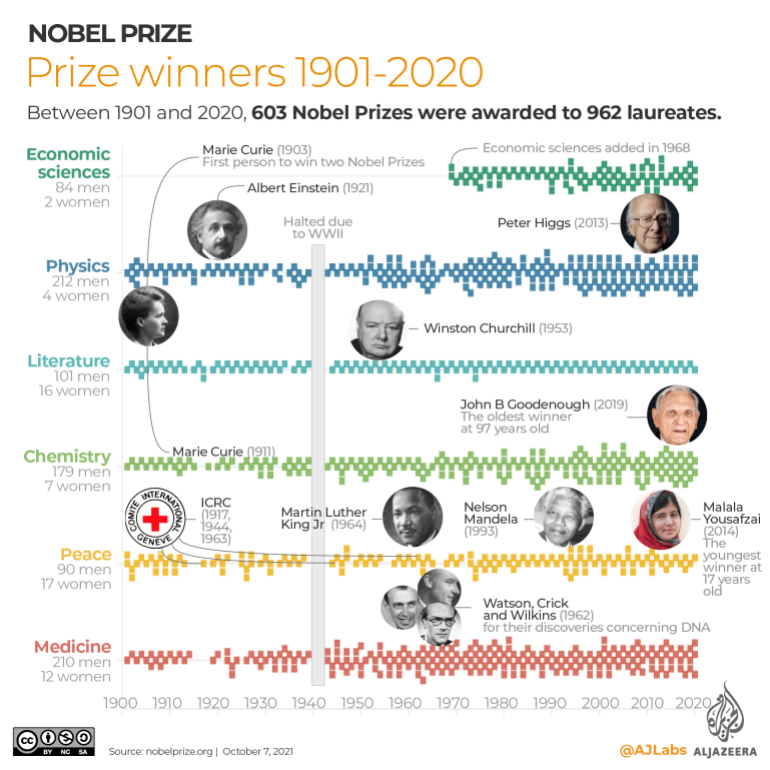Maria Ressa and Dmitry Muratov win 2021 Nobel Peace Prize
Journalists from the Philippines and Russia hailed ‘for their efforts to safeguard freedom of expression’.

Journalists Maria Ressa, of the Philippines, and Dmitry Muratov, of Russia, have won this year’s Nobel Peace Prize, recognised “for their efforts to safeguard freedom of expression”, which the prize-giving committee described as being under threat worldwide
The two were given the prestigious award “for their courageous fight for freedom of expression in the Philippines and Russia,” Berit Reiss-Andersen, chair of the Norwegian Nobel Committee, said on Friday.
Keep reading
list of 4 itemsMaria Ressa and Dmitry Muratov win 2021 Nobel Peace Prize
Nobel Peace Prize: Kremlin lauds ‘brave’ journalist Muratov
‘Tribute to journalism’: Praise pours in for Nobel prize winners
“At the same time, they are representatives of all journalists who stand up for this ideal in a world in which democracy and freedom of the press face increasingly adverse conditions,” she told a news conference in Norway’s capital, Oslo.
The prize is the first for journalists since German Carl von Ossietzky won it in 1935 for revealing his country’s secret post-war rearmament programme.
“Free, independent and fact-based journalism serves to protect against abuse of power, lies and war propaganda,” Reiss-Andersen said.
Ressa, who founded investigative journalism website Rappler, has focused much of her work on Philippine President Rodrigo Duterte’s controversial and violent war on drugs. She and Rappler “have also documented how social media is being used to spread fake news, harass opponents and manipulate public discourse,” the Nobel committee noted.
“I’m a little shocked. It’s really emotional,” Ressa said after learning of the award.
“Journalism has never been as important as it is today,” she said, adding that journalists had “lost our gatekeeping powers to technology platforms” and called for nations to come together to stop the rise of misinformation.
She also said that despite her news website being under “the possibility of shutdown on a daily basis” she continues striving for fact-finding journalism.
The award-winning journalist was convicted last year of libel and sentenced to jail in a decision seen as a major blow to press global freedom. She was the first woman awarded a Nobel this year.
“If you keep the North Star ahead of you, you protect the facts, you hold power to account. You exercise the rights that is in the Philippine Constitution. That’s what we did, and that’s what we’ll keep doing,” she said.
Muratov founded the Russian newspaper Novaya Gazeta in 1993 and has been its editor-in-chief for 24 years. It is today one of the very few independent media outlets in Russia, and has seen six of its journalists murdered during that time.
“I can’t take credit for this. This is Novaya Gazeta’s. It is that of those who died defending the right of people to freedom of speech,” Muratov was cited by Russian news agency TASS as saying.
Muratov said he would use his win to help independent journalists who have faced growing pressure from the authorities, including those whose organizations were declared “foreign agents” — a designation that threatens to bring more government scrutiny.
“We will use it to shore up Russian journalism that has faced repressions,” he said in comments carried by a Russian messaging app channel. “We will try to help the people who have been designated as agents, have faced persecution and have been forced out of the country.”
According to the Committee to Protect Journalists, 17 media workers were killed in the Philippines in the last decade and 23 in Russia.
Soon after the announcement, the Kremlin congratulated the Russian journalist despite the fact that his newspaper has often criticised Russian authorities.
“We can congratulate Dmitry Muratov,” Kremlin spokesman Dmitry Peskov told reporters. “He persistently works in accordance with his own ideals, he is devoted to them, he is talented, he is brave,” he added.

Last year’s prize went to the World Food Programme for its efforts to combat hunger and food insecurity around the globe.
The award is accompanied by a gold medal and 10 million Swedish kronor (over $1.1m). The prize money comes from a bequest left by the prize’s creator, Swedish inventor Alfred Nobel, who died in 1896.
On Monday, the Nobel Committee awarded the prize in physiology or medicine to Americans David Julius and Ardem Patapoutian for their discoveries into how the human body perceives temperature and touch.
The Nobel Prize in physics was awarded Tuesday to three scientists whose work helped explain and predict complex forces of nature, including expanding our understanding of climate change.
Benjamin List and David WC MacMillan were named as laureates of the Nobel Prize for chemistry on Wednesday for finding an easier and environmentally cleaner way to build molecules that can be used to make compounds, including medicines and pesticides.
The Nobel Prize for literature was awarded on Thursday to Tanzanian author Abdulrazak Gurnah, who was recognised for his “uncompromising and compassionate penetration of the effects of colonialism and the fate of the refugee”.
Still to come on Monday is the prize for outstanding work in the field of economics.
